President’s Report to the Board of Governors (September 2019)
Click here to view a PDF version of the report.
Reputation and Community Highlights
Celebrating Convocation
June Convocation included nine ceremonies and approximately 5,000 graduates — 3,983 undergraduates and 967 graduate students. Honorary doctorates were conferred on Diana Beresford-Kroeger, Robert Slater, Christina Louise Logue, Laurie Beachell, Robert Thirsk, Yazmine Laroche and The Right Honourable Paul Martin. A wonderful highlight was the formal installation of new Chancellor Yaprak Baltacioğlu. “For countless immigrants before and after me, Canada has been a love story — a place of refuge,” she said in her address. “A place of welcome. A place of opportunity. And not only did I get to live in one of the most wonderful countries on Earth, I also got to work in Canada’s extraordinary public service. And the public service has been the entity through which I reciprocated my love for Canada for more than a generation. And I am hoping to reciprocate to Carleton through my role as its Chancellor.”
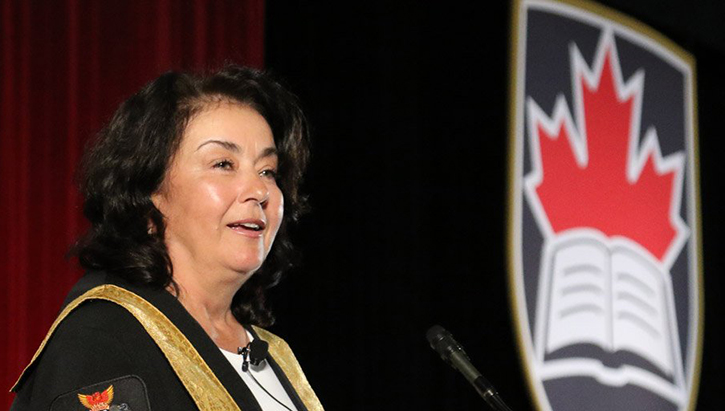
Smart Environments (ARISE) Building Preview
Impactful partnerships and advances in sustainability were front and centre on Aug. 27 as a group of government, technology and higher education leaders came together at Carleton for a preview of the new Smart Environments building — a hub specifically designed for multidisciplinary research partnerships with government and the private sector. The morning reception in the 70,000-squarefoot, five-floor building, in a room overlooking the Rideau River, was an opportunity for the university to celebrate the importance of collaboration and thank partners who have contributed to both the $29.5-million building and a $20.7-million upgrade for Carleton’s nearby co-generation facility. “This is a very exciting day for the university,” said Carleton President Benoit-Antoine Bacon. “We are showcasing two projects that demonstrate the importance of partnerships, of how we can work together for good. This beautiful building that we’re in would not have been possible without the generous $13.45 million we received from the Government of Canada’s Strategic Investment Fund.”
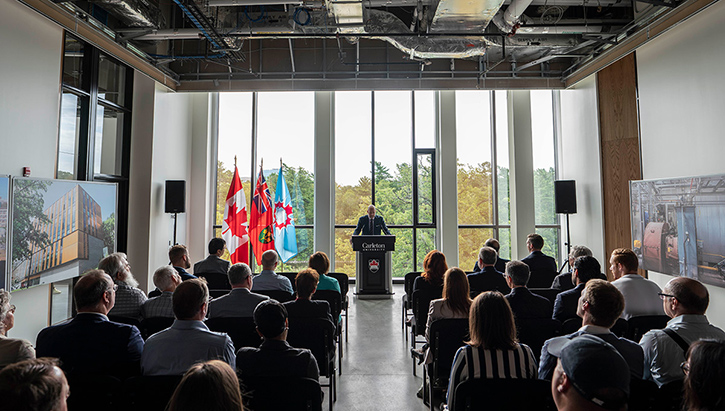
Carleton Hosts Indigenous Youth Gathering
Young people from across Nishnawbe Aski Nation (NAN) territory in northwestern Ontario gathered at Carleton for the NAN Youth Leadership Development Initiative in late July. The weeklong series of workshops and sessions was a partnership between NAN, Carleton and the federal Department of Crown-Indigenous Relations and Northern Affairs. The initiative’s curriculum was jointly developed by the university and NAN’s education unit, and focused on leadership skills using approaches that align with the traditional teachings and values of the Nishnawbe-Aski.
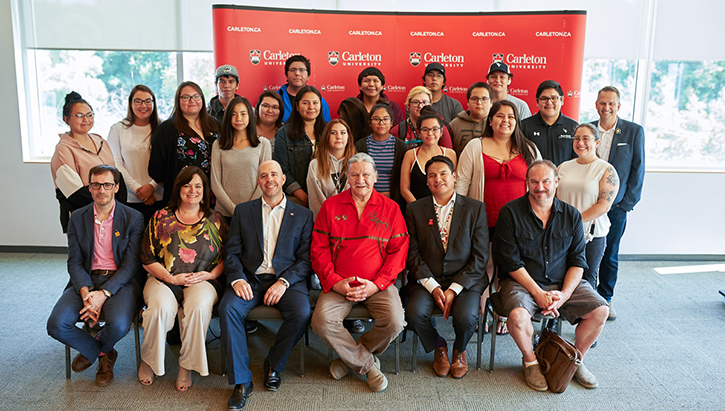
Strategic Planning Process Begins
A campus-wide event on Sept. 5 marked the official launch of Carleton’s strategic planning process. About 250 people attended “Carleton’s Strategy: The Next Chapter,” where the four co-chairs of the Strategic Integrated Plan (SIP) Task Force — Deputy Provost Lorraine Dyke (Academic Operations and Planning), Clerk of Senate Betina Appel Kuzmarov, Faculty of Graduate and Postdoctoral Affairs Dean Patrice Smith and Cindy Taylor, the Assistant Vice-President of Human Resources — introduced the process that Carleton will undertake over the next year. Together, they will lead a task force of faculty, staff and students who are representative of Carleton’s faculties as well as research, student support and administrative units. The task force is hosting a guest speaker series to prompt members of the Carleton community to think strategically about significant topics related to higher education. Open consultation sessions have been scheduled and are available for registration. Later in the fall, themed consultation sessions will be scheduled based on feedback received through the open consultation events. The launch event featured a keynote by higher education expert and futurist Ken Steele.
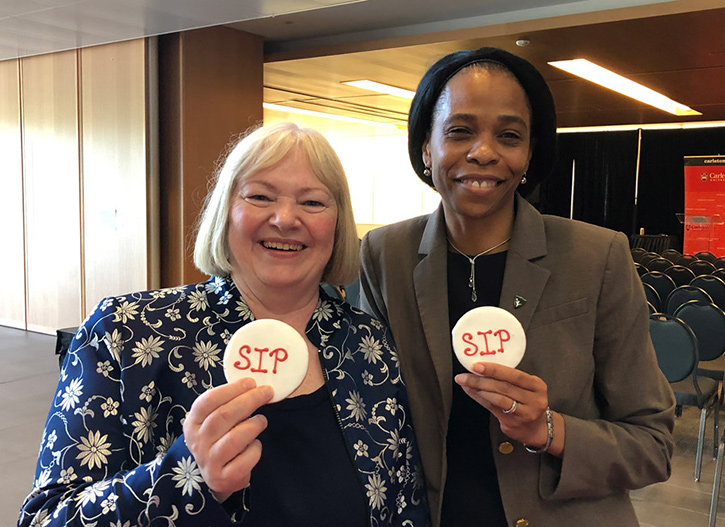
Academics
Strategic Indigenous Initiatives Committee
The work of the Carleton University Strategic Indigenous Initiatives Committee (CUISIC) is continuing. The committee co-chairs have continued to consult with Indigenous communities, which included a recent visit to Iqaluit, Nunavut. The Carleton community will be consulted on the draft calls to action during the fall term.
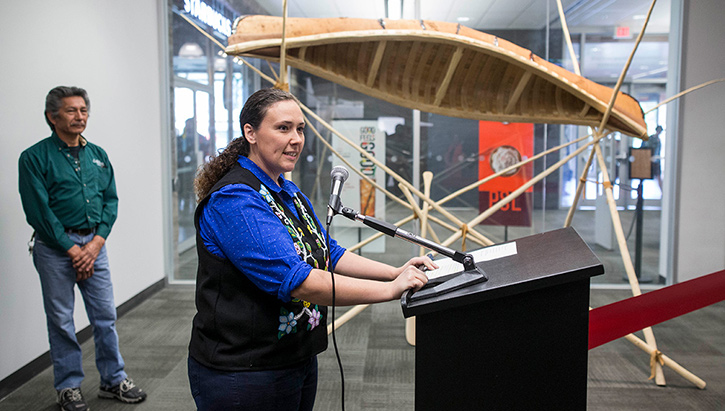
Minister McKenna Roundtable with Engineering Students
Federal Environment and Climate Change Minister Catherine McKenna sat down with a couple dozen students from Carleton’s Faculty of Engineering and Design on Sept. 5 for an informal conversation about the value of equity, diversity and inclusion. “Inclusiveness is really important, and it requires thought — it doesn’t happen by accident,” said McKenna, whose Ottawa Centre riding includes the Carleton campus. “These conversations matter, but it matters more that we act on them.” The gathering, motivated by a desire to encourage more women to enter science, technology, engineering and math (STEM) fields, was moderated by Mechanical and Aerospace Engineering Prof. Cynthia Cruickshank.
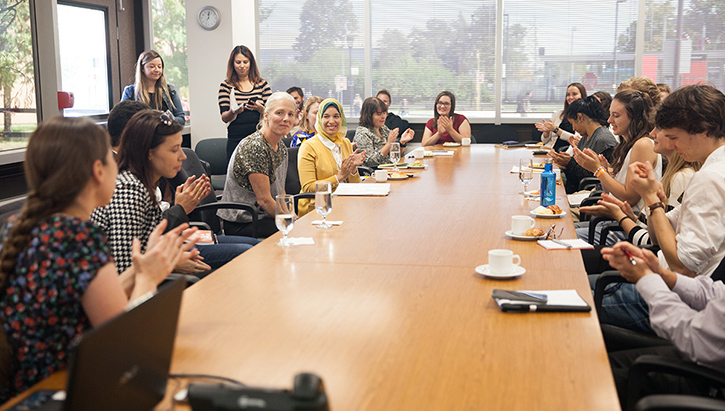
New Deans on Campus
Three new deans began five-year mandates at Carleton on July 1. Dana Brown joined the Sprott School of Business after serving at De Montfort University and Oxford in the U.K. Larry Kostiuk, previously at the University of Alberta, is overseeing the Faculty of Engineering and Design. Finally, Patrice Smith — an accomplished neuroscientist who previously served as an associate dean in Carleton’s Faculty of Science — is the new dean of the Faculty of Graduate and Postdoctoral Affairs.
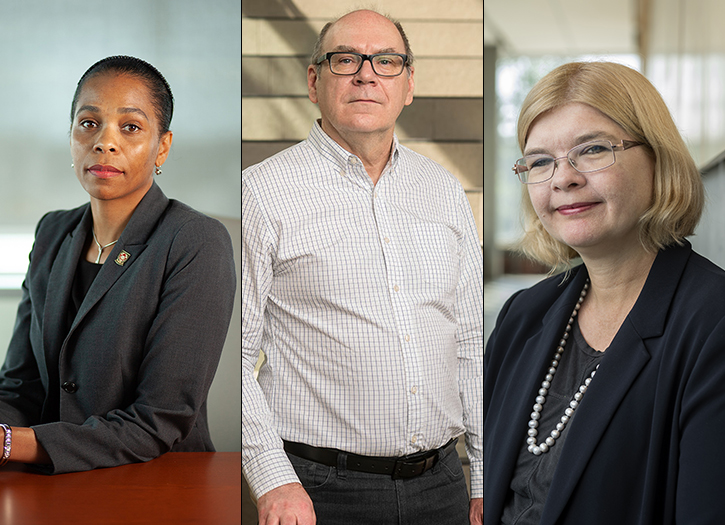
Welcoming New Academic Staff
Teaching and Learning Services hosted orientation sessions for new faculty, instructors, librarians and contract instructors. To see the full list of faculty, instructors and librarians who were appointed to full-time preliminary or tenuretrack positions between July 2, 2018, and July 1, 2019, please click here.
Promotion and Meritorious Appointments
Promotions and meritorious appointments, effective July 1, 2019, have been announced. Please join us in congratulating our colleagues and thanking them for the important contributions they have made to Carleton and will continue to make in the years ahead. To see the full list, please click here.
Chancellor’s Professor Appointments
Carleton Profs. Lenore Fahrig (Biology) and Shikharesh Majumdar (Systems and Computer Engineering) were appointed as Chancellor’s Professors, a rank reserved for highly esteemed faculty members whose research activities have been, and continue to be, of outstanding merit with substantial international impact.
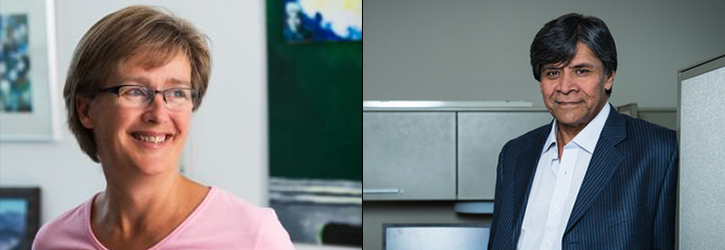
Teaching Awards
- Profs. John Stead (Neuroscience), Anne Trépanier (Indigenous and Canadian Studies) and Winnie Ye (Department of Electronics) received the Provost’s Fellowship in Teaching Award for their leadership and commitment to teaching and learning. They have also been designated as Carleton University teaching fellows.
- Profs. Achim Hurrelmann (Political Science; European, Russian and Eurasian Studies) and Danielle Kinsey (History) received the Excellence in Blended and Online Teaching Award for their exceptional impact on student learning in blended and online environments.
- Profs. Sonia Gulati (Health Sciences), Rishad Irani (Mechanical and Aerospace Engineering), Omair Shafiq (Information Technology) and Ai Taniguchi (Linguistics and Language Studies) received the New Faculty Excellence in Teaching Award.
- Profs. Melanie Adrian (Law and Legal Studies) and Mira Sucharov (Political Science) received the inaugural Discovery Centre Fellowship, which recognizes a significant contribution to reflective and research-informed teaching.
- Scholarship of Teaching and Learning (SoTL) Grants were awarded to: Mustafa Bahran and Alain Bellerive (Physics); Samuel McCready (History); Sophie Tamas (Geography and Environmental Studies/Indigenous and Canadian Studies); Kim Hellemans, Kim Matheson and Hymie Anisman (Neuroscience); Robyn McQuaid (Royal Ottawa Hospital) and Larry McCloskey (Paul Menton Centre); Paulo Garcia (Systems and Computer Engineering). Deanna C. Whelan (Psychology) and Shermeen Nizami (Health Science) also received funding for teaching development projects in their courses.
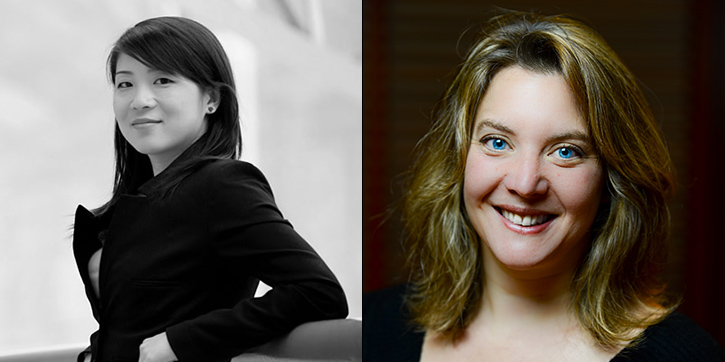
Provost Scholar Awards
Provost Scholar Awards were presented to undergraduate students Zaynab Al-Hemed, Alaa Azan, MacKenzie Brannen, Rebecca Butler, Allysa Czerwinsky, Julianne Dumont, Gemma Rod and Kayla Schumacker at an event hosted by the Discovery Centre in April. The inaugural Peter J. Ricketts Outstanding Provost Scholar Award was presented to Mohamed Hozayen.
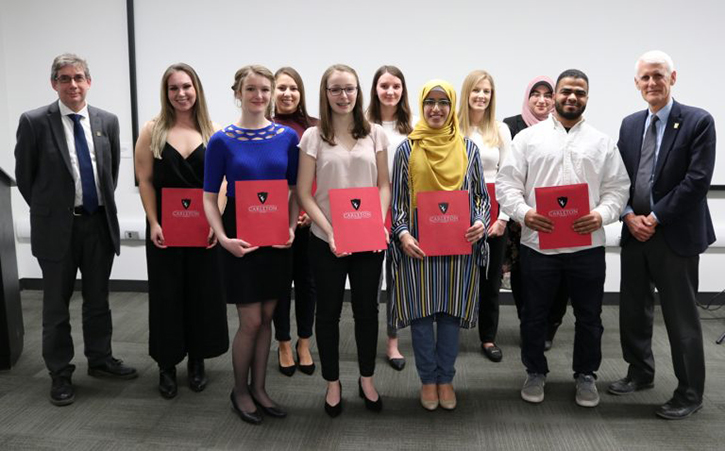
Experiential Learning and Employability
In the Fall 2018 term, the new International Internship Program was opened to students university-wide, with a targeted recruitment of students in the Faculty of Public Affairs. Through this high-impact experiential learning program, 72 students successfully participated in the program and interned around the world in 27 difference countries this past summer. Placements included Canada’s Permanent Mission to the UN in New York City, interning as a Gender Officer with a local NGO in Peru and working with the Screen Directors Guild of Ireland.
The Carleton University Accessible Experiential Learning Project (CUAEL) is wrapping up a highly successful program that was funded by the Government of Ontario’s Career Ready Fund. Over the past 16 months, we have filled 225 experiential learning placements for students with disabilities, in addition to providing accommodation and disclosure supports to students and employers.
The first year of the David C. Onley Initiative — an Ontario government funded partnership with uOttawa, Algonquin College and La Cite — was a great success. The initiative continues to develop a transferable model to support skill development and preparation of students with disabilities for employment.
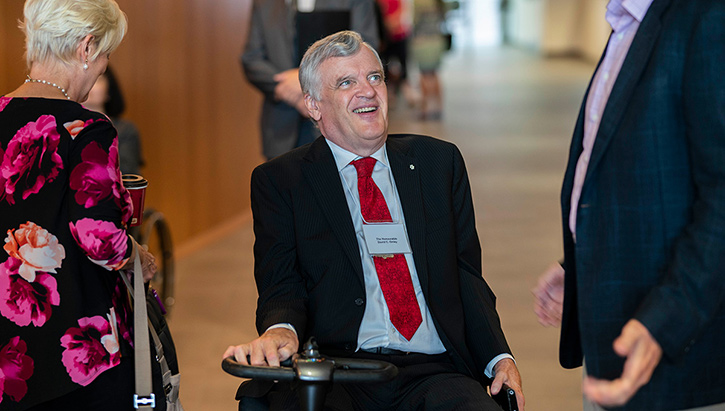
Research
NSERC Funds the Establishment of PermafrostNet
The Natural Sciences and Engineering Research Council of Canada (NSERC) will provide more than $5 million over five years to fund PermafrostNet, a Canadian research network of 12 universities and more than 40 partner organizations. This important partnership is led by Carleton’s Stephan Gruber, Canada Research Chair in Climate Change Impacts/Adaptation in Northern Canada. The objective of the highly competitive NSERC Strategic Partnership Grants for Networks is to increase research and training in targeted areas, contributing to a better quality of life in Canada. Only two networks were funded this year across Canada.
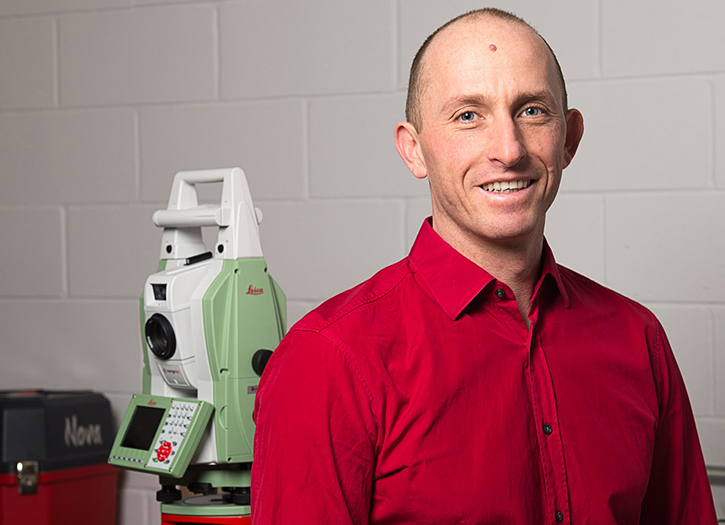
Cynthia Cruickshank Receives Funding to Reduce Emissions in Building Sector
Prof. Cynthia Cruickshank of the Department of Mechanical and Aerospace Engineering has received $5.1 million in funding from the Natural Resources Canada (NRCan) Energy Innovation Program and the Ontario Research Fund (ORF) to develop new building envelope technologies that will make Canada’s buildings more energy efficient and less greenhouse gas intensive. Environment and Climate Change Minister Catherine McKenna visited the Carleton campus to make the announcement.
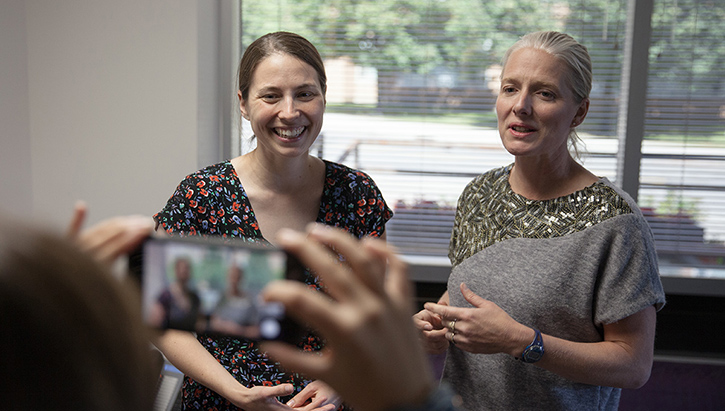
Carleton Launches $2M Project to Improve the Security of Connected e-Health Systems
Carleton and other partners have initiated a project valued at approximately $2 million through the Department of National Defence’s Canadian Safety and Security Program (CSSP) for research on e-health systems security enabled by the Internet of Things (IoT). The research will be led by Systems and Computer Engineering Prof. Mohamed Ibnkahla.
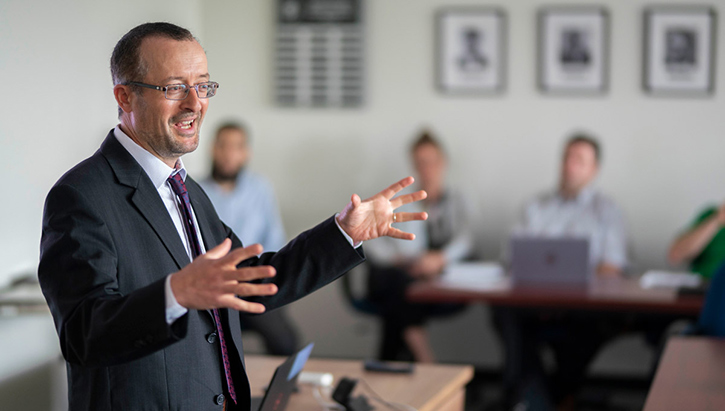
Carleton Announces Four Canada Research Chairs
Two Carleton professors, Robert Barsky and Robin Chhabra, have been announced as new Tier 1 and Tier 2 Canada Research Chairs (CRC) respectively, in addition to the renewal of Rowan Thomson, Canada Research Chair in Radiotherapy Physics, and Merlyna Lim, Canada Research Chair in Digital Media and Global Network Society. Robert Barsky has been named CRC in Law, Narrative and Border Crossing, while Robin Chhabra accepts the CRC in Autonomous Space Robotics and Mechatronics.
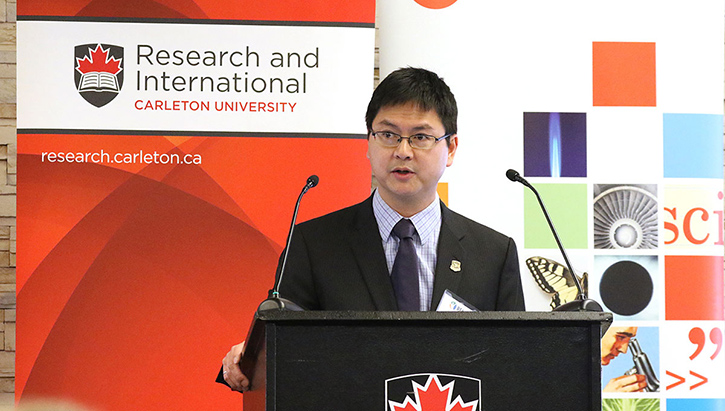
Carleton Creates Canadian Accessibility Network
Building on its reputation as Canada’s most accessible university, Carleton has launched the Canadian Accessibility Network — the first entity of its kind in the country. By leveraging strengths of individual stakeholders within a national network of partnerships, the Canadian Accessibility Network is creating collective regional and national capacity. Through the network, led by Prof. Adrian Chan, Carleton will work with partners to promote a more accessible and inclusive Canada and build on the goals of the new Accessible Canada Act.
Carleton Researchers Receive Grant to Improve Building Performance and Sustainability
Carleton researchers, led by Gabriel Wainer, a professor in the Department of Systems and Computer Engineering, and industry partner Autodesk, have received an NSERC Strategic Partnership Grant worth $617,000 to investigate new technologies that will assist in the design of more sustainable buildings.
Michael Weiss Receives Funding to Create Open Source Cyber Fusion Centre
Carleton’s Michael Weiss, a professor in the Department of Systems and Computer Engineering, received a $560,000 grant from the Ontario Centres of Excellence (OCE), PROMPT and NSERC to fund an Open Source Cyber Fusion Centre as part of the Cybersecurity R&D Challenge. The award will be shared with co-principal investigator Mourad Debbabi at Concordia University.
SSHRC Invests $2.5M to Support Security and Defence Network
Stephen Saideman, Carleton’s Paterson Chair in International Affairs, has received a $2.5 million Partnership Grant from the Social Sciences and Humanities Research Council of Canada (SSHRC) for his work on the Canadian Defence and Security Network (CDSN) to create an inclusive and innovative defence and security community in Canada.
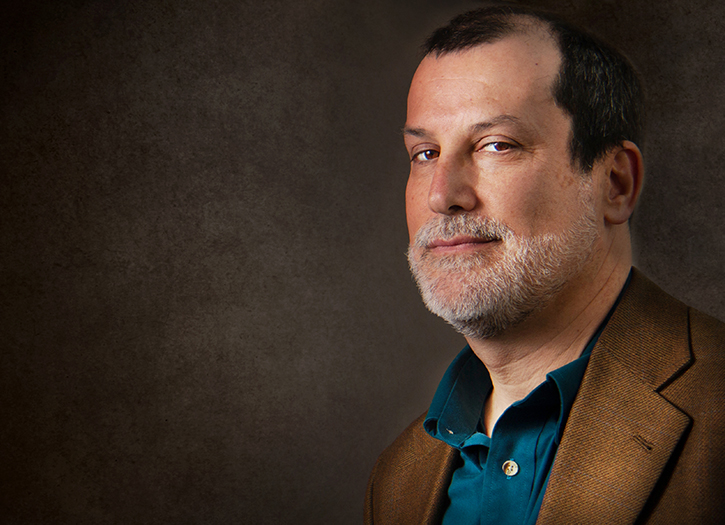
Aerospace Researcher Receives NSERC Funding for Uninhabited Aircraft Training
Carleton’s Jeremy Laliberté from the Department of Mechanical and Aerospace Engineering and partners from four other universities (École de technologie supérieure, Université de Sherbrooke, University of Ottawa and Queen’s University) have received $1.65 million in funding from the NSERC Collaborative Research and Training Experience (CREATE) program to address challenges with operating uninhabited aircraft systems (UAS).
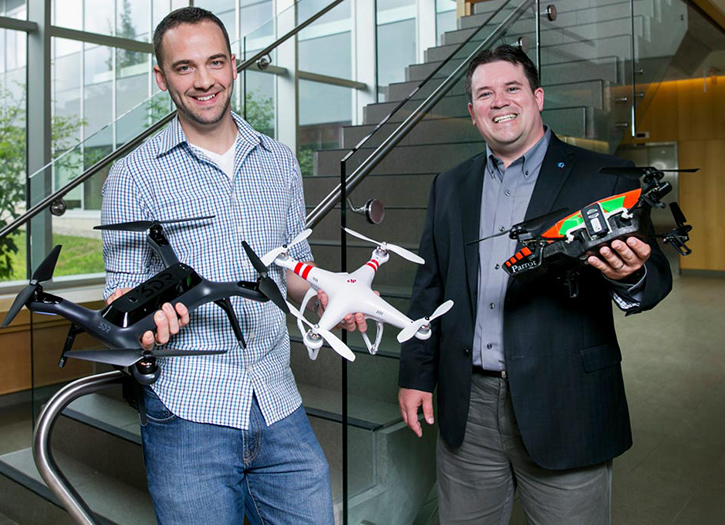
Burak Gunay Receives Funding to Improve Building Efficiency
Environment and Climate Change Minister Catherine McKenna visited the Carleton campus to announce that Department of Civil and Environmental Engineering Prof. Burak Gunay and fellow researchers Liam O’Brien and Scott Bucking have received $510,000 in funding from the NRCan Green Infrastructure Fund to develop new data-mining tools that will improve building energy efficiency, occupant comfort, health, and workplace productivity.
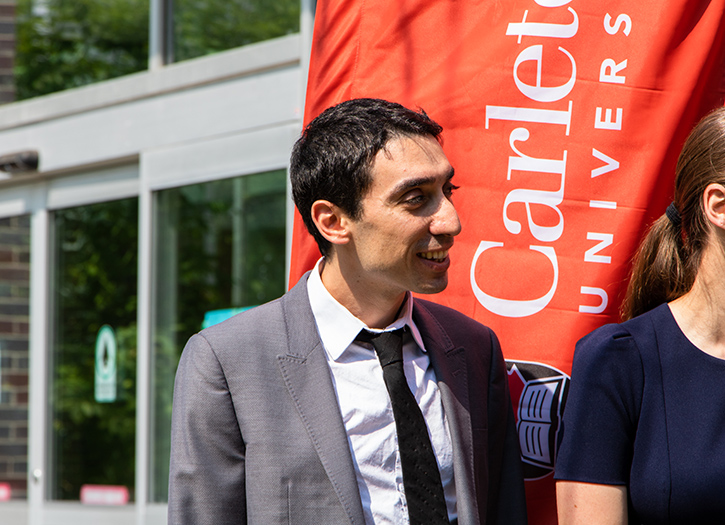
Carleton Faculty Receive CIHR Funding for Research Focused on the Health of Canadians
Two Carleton researchers have received almost $700,000 from the Canadian Institutes of Health Research (CIHR). Shawn Hayley, a professor in the Department of Neuroscience, will be using CIHR funding to investigate pesticides associated with Parkinson’s disease. Paul Villeneuve, a professor in the School of Mathematics and Statistics, is studying whether changes in air pollution and weather can be associated with suicide.
Researchers Receive CFI Funds to Protect Groundwater and Improve Healthy Behaviour
Carleton researcher Richard Amos from the Department of Earth Sciences and a team led by Department of Psychology Prof. Marina Milyavskaya have received approximately $204,000 in combined funding from the Canada Foundation for Innovation’s (CFI) John R. Evans Leaders Fund for work that will improve the healthy behaviour of Canadians and prevent the contamination of groundwater.
Projects on Global Talent, Youth Homelessness and Rural Communities Receive Support
Three Carleton research projects on recruiting global talent, ending youth homelessness and increasing the well-being of rural communities have been supported at almost $200,000 each by SSHRC. Carleton’s Martin Geiger in the Department of Political Science, Jacqueline Kennelly in the Department of Sociology and Anthropology, and Paul Peters, Department of Health Sciences, received Partnership Development Grants.
Carleton Receives NSERC Funding to Strengthen Research Leadership
Carleton has received more than $11 million in funding from NSERC in the form of Discovery Grants, scholarships and fellowships to support leading researchers in diverse areas, including public safety and cybersecurity, cognition, biology, physics and income inequality.
Carleton Faculty Awarded $1.8M in SSHRC Insight Grants
A dozen Carleton researchers have been awarded SSHRC Insight Grants. More than $1.8 million in funding will support innovative research in diverse areas, including collective nostalgia, immigration and elder care, accurately measuring the risk of investments, and disability in film. In addition, 54 Carleton graduate students have received more than $2.1 million in the form of fellowships and scholarships from SSHRC.
Student Life
Student Success and Student Experience
Summer Orientation welcomed more than 900 new students and over 800 parents and guests across six sessions in August 2019, a record turnout. These sessions highlight key campus services and resources, and start the process of adjusting to university studies. They also include campus tours.
Fall Orientation and Academic Orientation was high energy and extremely positive, with more than 4,500 new students participating.
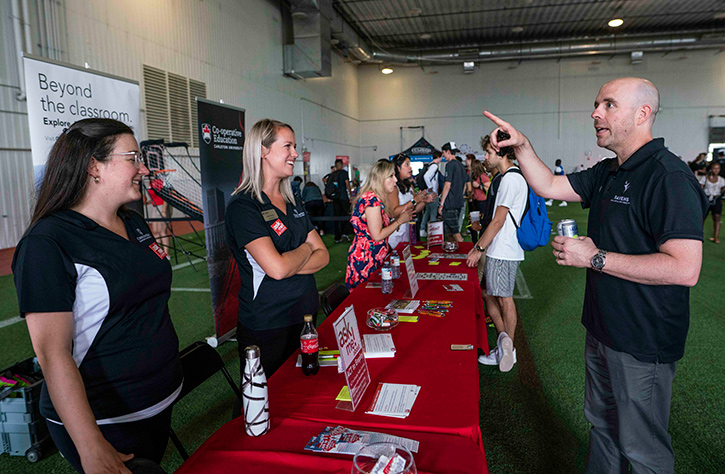
The International Student Services Office (ISSO) offered a robust orientation for new international students. This included I-Start Orientation sessions throughout August and September, a welcome event on Aug. 30 with more than 750 people and the Airport Welcome Program.
The First Year Connections program has reached a new milestone with more than 800 students registered (a 12% increase). Any first-year student, including international, transfer and first-generation students, who is looking to have a peer mentor during the first six weeks of the academic year will be matched with a mentor to support their transition to post-secondary education, including navigating campus, understanding campus resources availability and how to access them, and making connections with other students in the community.
The Ask Me Campaign saw faculty, staff and student leaders wearing red Ask Me buttons during the first couple of weeks of September to help make all students feel part of this supportive community.
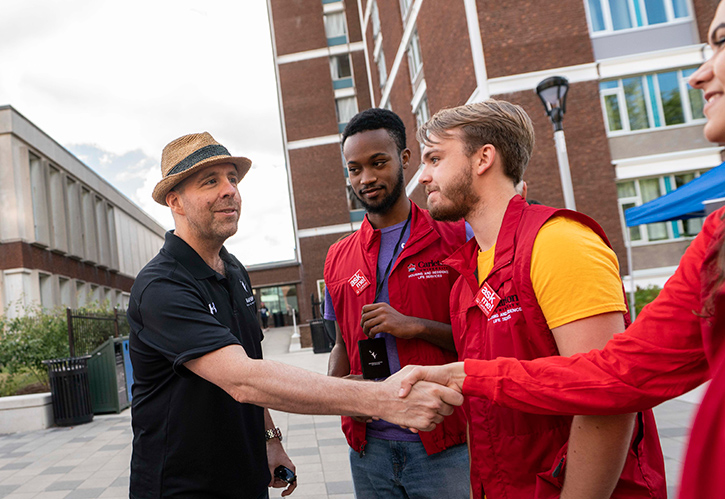
A new satellite fitness centre in residence was opened this fall. If successful this model can be replicated.
The Sexual Violence Prevention Strategy is currently being developed. This strategy is intended to be a living document and provide a three-year roadmap of activities that every member of our community can engage in as we continue to strive to enhance the education about, prevention of and response to sexual violence on our campus.
On Sept. 12 Carleton launched an expanded Carleton Therapy Dog program. After receiving permanent funding for a position, this program has expanded to include a total of 13 dogs with Carleton faculty and staff as handlers. This program is part of a campus-wide mental health initiative that fosters a welcoming and supportive environment and will help to facilitate referrals and address mild-to-moderate mental health concerns. Students are encouraged to visit with the dogs and collect their business cards!
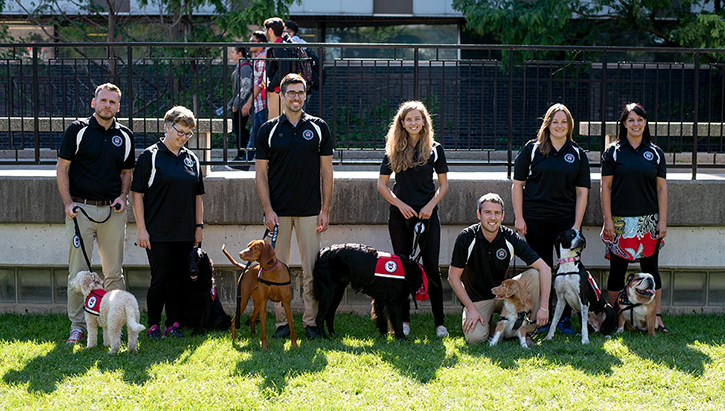
Under the guidance of the new Director, Health and Counselling Services, Carleton continues to improve access to services for students. We are moving into the academic year with four psychiatrists and four GP-psychotherapists. In collaboration with the newly renamed Department of Equity and Inclusive Communities, we have successfully recruited an Indigenous Counsellor.
Health and Counselling Services will be piloting a “Mindfulness for Emotional Resilience” group for both the fall and winter terms and a “Culture Shock” group in the International Student Services Office this fall.
The CU Spirit Day program returned to campus on Sept. 13. Faculty, staff and students are encouraged to purchase a quarter zip sweater (with proceeds going to Carleton’s Here for Good campaign). All members of the Carleton community are encouraged to wear this shirt on every Friday to celebrate Ravens spirit.
After considering feedback from the Carleton community, the draft of Carleton’s Coordinated Accessibility Strategy will be released to the community this fall for further consultations and feedback.
Three former Carleton Ravens played on Canada’s national basketball team at the FIBA World Cup in China in early September. Congratulations to Phil Scrubb, Thomas Scrubb and Kaza Kajami-Keane. Go Ravens!

Advancement
University Advancement begins the new academic term with momentum from the Collaborate campaign and a renewed mandate to build new pathways to partnership for our community. With the guidance of the leadership team and Board of Governors, and in preparation for the new Strategic Integrated Plan, we are renewing a “Campaign for Good” — a focused effort to build financial support for five key fundraising priorities. This work will connect with two new initiatives leading from an expanded departmental mandate. These initiatives — Community Liaison and Holistic Partnerships — are being developed with key campus partners and will both lead to new collaboration opportunities on campus and in the community.
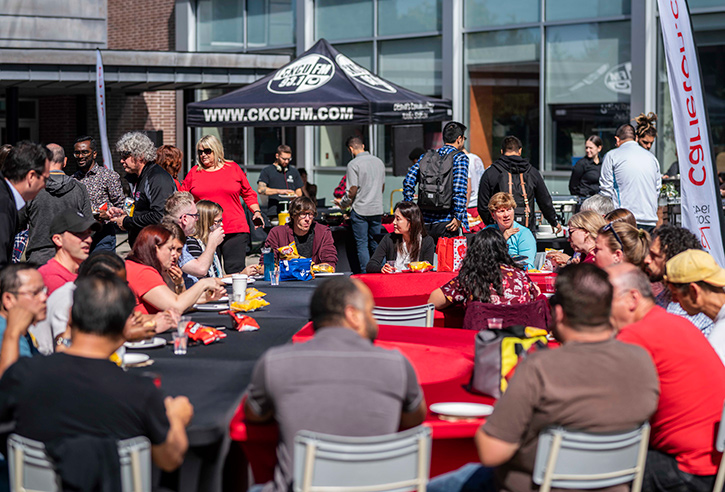
Inspired by the generosity and vision of our supporters, we will share our message and commitment to doing good. Throughout the 2019-2020 academic year, we will invite our partners to be “Together for Good” — to join us to accomplish good and meaningful things for the entire community.
Fundraising Activity May 1 to August 31, 2019
Annual: $579,830
Major/Transformational: $2,569,865
Total: $3,149,695
Revenue Detail May 1 to August 31, 2019
Charitable Gifts (Non-Research): $2,257,407
Sponsorships: $581,938
Research Partnerships: $310,350
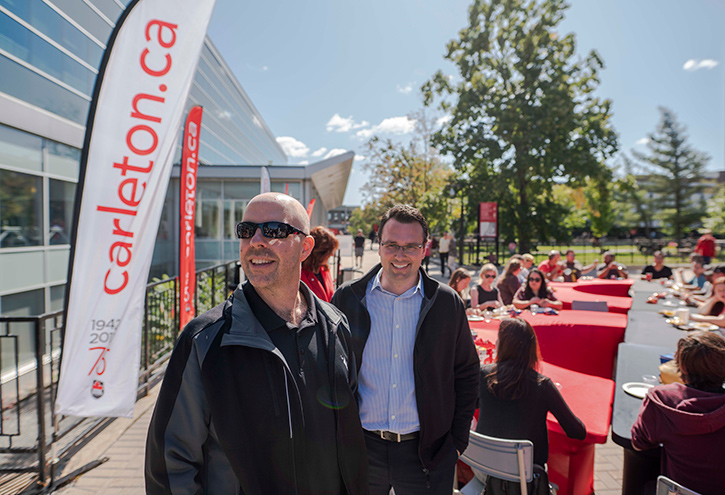
We have been working diligently engaging alumni and donors with transformational-level capacity and interest across Canada and internationally to ensure that we deepen our donor pipeline. The 2018-2019 President’s Report was an opportunity to reach out to our top donors and prospects to instill joint pride in what we have collectively achieved.
In the post-campaign period, we continue to apply their fundraising efforts to Athletics, the Carleton Dominion-Chalmers Centre, student aid and faculty-based opportunities such as the Nicol Building, Women in STEM and student experience funds. Launching and operationalizing the new holistic integrated partnership initiative with Office of the Vice-President (Research and International) has been and continues to be a top priority.
Meanwhile, stewardship of our generous donors continues. Most recently, donors who established endowments received their annual endowment impact report. And this year totals the most number of reports on endowed funds to date at over 900.
Nearly 10,000 members of the Carleton community came back to campus for our seventh annual Throwback — Carleton’s homecoming celebration. The week-long festivities included class reunions, guest lectures, socials events and varsity games, including the homecoming football game. Among the 30 events, the Carleton University Art Gallery opened its fall exhibitions, the signature FPA Currents Lecture featured the CEO of Abacus Data David Coletto, a Sprott School of Business alumni panel was held at Shopify, and a Milestone Anniversary Brunch was hosted to honour alumni who were celebrating a special anniversary of their graduation.
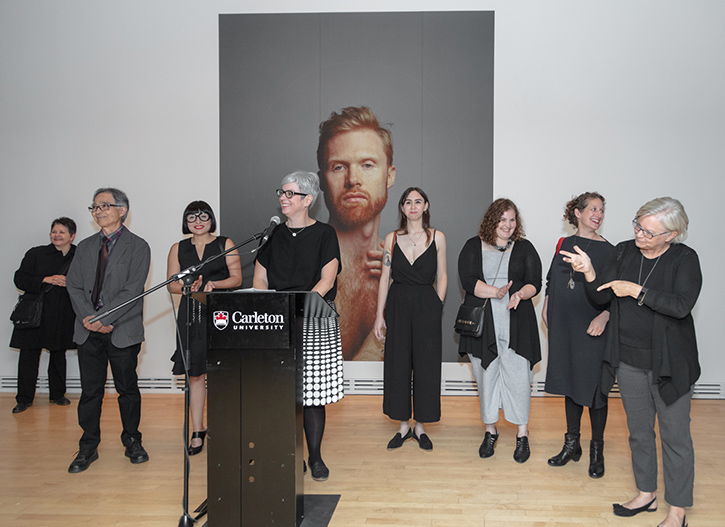
Giving Tuesday is our opportunity to come together as staff, faculty, alumni and friends to make a difference and leave a positive mark on the world around us. Mark your calendars for Tuesday, Dec. 3, and make an impact by supporting initiatives that are meaningful to our campus community and beyond through FutureFunder. Together, we are a force for good.
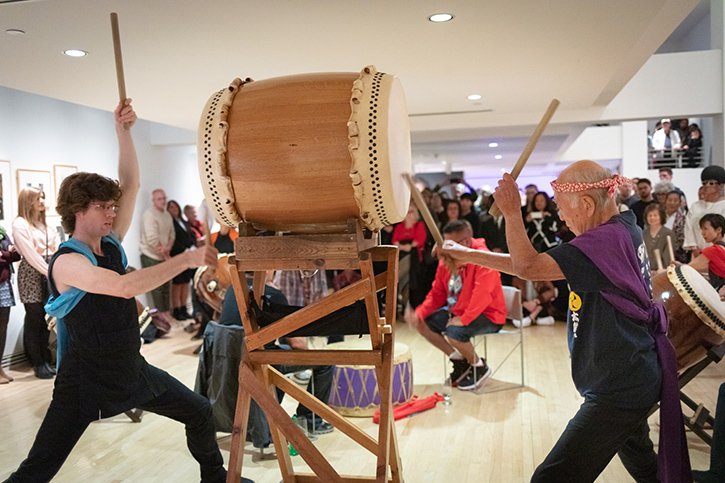
Enrolment Update
| Applicant / Targets – Fall 2019/20 Ontario University Application Centre Systems Data – First Year | |||
|---|---|---|---|
| 2019 | 2018 | % +- | |
| Applicants | 159,593 | 156,925 | 1.7% |
| Confirmations | 104,635 | 101,670 | 2.9% |
| Applicants (H.S. – OUAC 101s) | 91,900 | 89,869 | 2.3% |
| Confirmations (H.S. – OUAC 101s) | 74,441 | 72,922 | 2.1% |
| Carleton University First Year | |||
|---|---|---|---|
| 2019 | 2018 | % +- | |
| Applicants | 24,559 | 24,231 | 1.0% |
| Confirmations | 6,471 | 6,382 | 1.4% |
| Applicants (H.S. – OUAC 101s) | 15,675 | 15,041 | 4.4% |
| Confirmations (H.S. – OUAC 101s) | 4,414 | 4,275 | 3.3% |
| Carleton University Target (Full-time, Fall) Projection Using Current Data / (Target) | |||
|---|---|---|---|
| 2019 | 2018 | % +- | |
| First Year (New) | 5,397 / (5,498) | 5,322 | 1.4% |
| Undergraduate | 21,635 / (21,625) | 21,380 | 1.2% |
| Total (FT+PT) Enrolment | 31,542 / (31,520) | 31,202 | 1.1% |
Carleton data as at Aug. 23, 2019; OUAC data as at Aug. 8, 2019 (with matched dates in 2018).
Recruitment Update
The 2019-20 undergraduate recruitment season has begun. Our recruiters are planning to visit more than 600 high schools across the country to talk to prospective students. In addition, our high school outreach initiatives are continuing to expand with increased partnerships with faculty members and academic departments, collaboration with Ottawa school boards and initiatives targeted to high-achieving high school students.
The international admissions team will visit more than 400 high schools and attend approximately 100 events in 40 countries across the Indian subcontinent, Middle East, Southeast Asia, Africa, the Caribbean, Europe and Latin America. New initiatives include enhanced agent relationships, strengthening our international student ambassador network and enhanced online events and communications.
The Ontario Universities’ Fair (OUF) ran from Sept. 27 to 29 and more than 100 Carleton students, staff and faculty attended to speak to prospective students. More than 130,000 students and parents were expected to attend this year’s OUF. Additionally, our Fall Open House Days will be held on campus on Oct. 19 (Engineering and Design, Science) and Oct. 26 (Arts and Social Sciences, Public Affairs and Sprott School of Business).